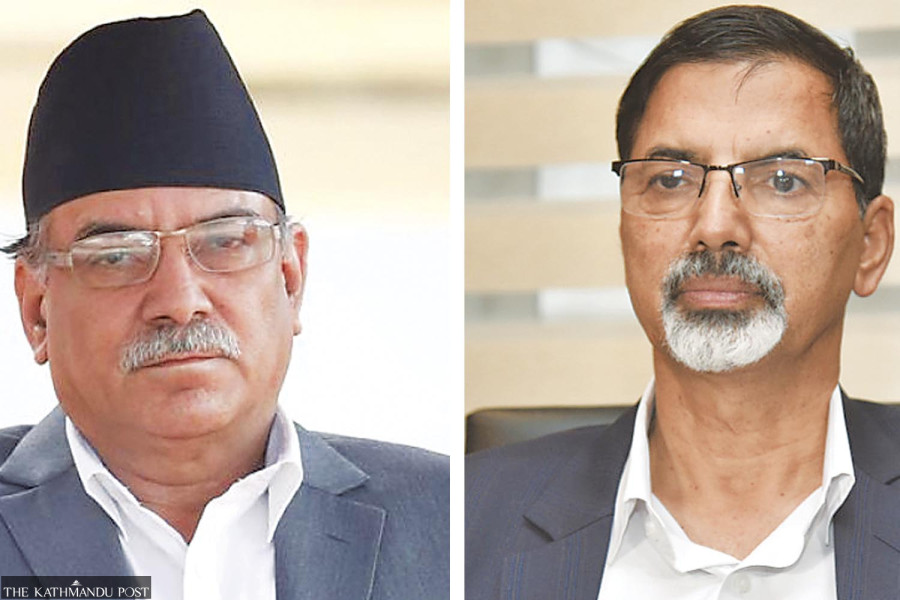Politics
Maoists side with Chairman Dahal, put pressure on Sharma to apologise
At ongoing Maoist top meeting, most leaders stress unity, reject calls for leadership change.
Anil Giri
CPN (Maoist Centre) chair Pushpa Kamal Dahal seems to have regained his footing in the party.
On Friday, Dahal proposed 10 different agendas for discussion at the party’s Standing Committee meeting. Besides the factional feud between Dahal and party’s deputy general secretary, Janardan Sharma, the meeting also deliberated on issues related to party organisation, collaboration with other communist forces, party unity, dissolution of cliques inside the party, and new ways for electing party leadership.
But most Standing Committee members who spoke on Friday and Saturday focussed on the feud between Dahal and Sharma and largely ignored other issues.
As many as two dozen committee members spoke and the majority sided with Dahal in the feud. Dahal’s grip in the party has once again been clearly demonstrated, according to three standing committee members.
Almost all members criticised Sharma’s recent remarks, stating that this is not the time to seek an alternative to party chair Dahal.
Sharma had been openly questioning Dahal’s leadership even as the party chair was adopting a more defensive approach. Sharma has been raising voice on the need for a change in leadership. Of late, Sharma has also accused all communist prime ministers, with the exception of Manmohan Adhikari, of being corrupt and engaging in “extortion.”
According to one Standing Committee member, most members who spoke on Friday and Saturday asked Sharma to “admit his mistake” for publicising the party’s internal matter and criticising the party leadership openly.
Leaders have suggested that Sharma should undergo “self-criticism”, said Haribol Gajurel, the deputy secretary general of the party. “All party leaders should respect the party’s discipline and rules.”
According to Gajurel, the standing committee members also spoke on other issues like maintaining unity in the party, unification with Socialist Forum, strengthening the organisation, resuming party’s organisation drive, and changing the party’s election process.
“We had expected the majority of the standing committee members would demand action against Sharma,” said a standing committee member. “But no one did.”
“The way [deputy general secretary] Barsha Man Pun took a middle path, it was clear that Dahal is not in favour of taking any action against Sharma,” the standing committee member said.
Speaking on the Dahal-Sharma conflict at the meeting, Deputy General Secretary Pun said, “No one would be punished by the party for expressing their views. Emphasising the need to end factionalism in the Maoist Centre, he claimed the party would emerge even more united under Dahal’s leadership.
But a few leaders like Ram Karki, Anjana Bishankhe and two other members spoke in Sharma’s support.
Most leaders spoke vaguely, said Ram Karki. “The way the issue was blown up outside, the situation in the party was never that serious.”
“At the same time, the party leadership should also avoid indulging in self-praise, and learn to take criticism,” said Karki.
At the meeting, Karki had proposed changing the party’s leadership every nine months. “Now we must search for leadership in a new way. For the party’s transformation, let’s introduce a rotational system. Where did we go wrong after entering the peace process? Why is the party in steady decline? Democracy within the party is weakening and there is too much centralisation of authority. How can a party run in such an autocratic style? Shouldn’t we review this?"
Sharma, for his part, has been defending his statements. His recent accusation that all communist prime ministers, except for Manmohan Adhikari, were involved in extortion, has stirred controversy, and Dahal and his supporters have been demanding an apology from Sharma. However, at Saturday’s meeting, Sharma maintained that his criticism was aimed solely at UML leaders, and not at Dahal.
Party spokesperson Agni Sapkota stated that the leaders at the meeting stressed the need for strict enforcement of party rules and procedures to move the party in a unified manner.
According to Sapkota, the meeting also raised the need for brainstorming sessions for developing new ideas.
“All matters concerning the party were discussed,” he said, reiterating that the Maoist party will not split under any circumstances. “The party will emerge even more united after the meeting.”




 10.12°C Kathmandu
10.12°C Kathmandu















